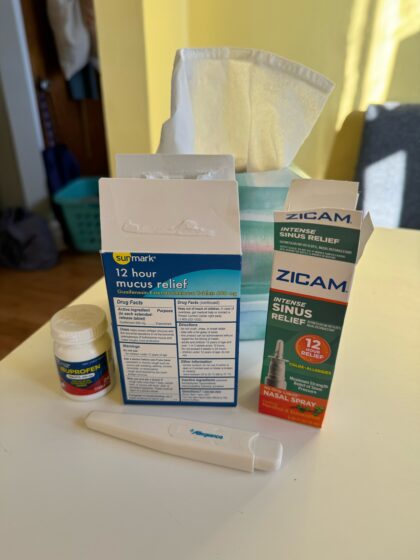In our society, both self-care and community care are counter-cultural. I’ve known that for a while, but I came face to face with it in a personal way this week—especially yesterday, as I was making a hard decision.
The decision shouldn’t have been hard. I am on Day 11 of a respiratory bug that is not COVID, but might be walking pneumonia. At an appointment yesterday afternoon, I was prescribed antibiotics. I definitely should not be having in-person meetings today.
Here’s the catch, the point where taking care of myself and you by only having online meetings today almost didn’t happen: I felt guilty. I felt like I shouldn’t miss another Wednesday after I took a couple of sick days last week, from this same illness. Working from home didn’t feel like “enough,” whatever that means.
Let me be clear: not one person at UUFM has even hinted that I should come to work in person while sick. The pressure has come entirely from myself.
Or has it?
I’m in an online clergy coaching group focused on sustainable ministry. Yesterday happened to be our monthly meeting, and the topic was what messages we have absorbed about subjects like work and responsibility, and where they came from.
While each of us had examples of both positive and negative messages spoken or modeled by individuals in our lives, we also named our culture as a source of unhealthy messages—including that overworking, or working despite being sick, is seen as a sign of dedication, something to be admired. How many of us have been in conversations that felt like competitions about who overworked the most that week, or who had “perfect attendance” at work or school despite illnesses? I know I have—in corporate, academic, and religious settings alike. Sometimes I was the one bragging, and certainly I have been the person who showed up at work despite being ill, when what my body needed was rest. No one in my family taught me to do that—but our culture did. I realize that’s just the water we swim in, but I am trying to swim against that particular current.
In some parts of our culture, including many congregations, we collectively swam against that current soon after COVID arrived in 2020. We realized that sometimes, showing up “no matter what” is actually harmful rather than valiant, and that sometimes the choice most aligned with our values, not culture’s norms, is to prioritize individual and collective health over productivity or efficiency. (I wonder what the world would be like if we *always* prioritized wellness?)
Now that we have COVID vaccines and many of us feel less vulnerable, much of life has returned to normal…but we have kept some changed habits, and I believe it’s a good thing. (A topic for another day: the fact that for those with some kinds of chronic illnesses, nothing has really returned to normal, because the risks are too high and the potential costs too great.)
I have noticed on recent Sundays that as I look out at you from the pulpit, more of you are masked. I know some of you mask occasionally because of a recent exposure, some mask routinely because of a health vulnerability of your own or of someone in your life, and some because there are a lot of illnesses circulating right now, including COVID, RSV, and flu, and you just want to be careful.
I deeply appreciate the ways that we practice community care, whether by masking, staying home when sick (with anything, not just COVID), or other cautionary measures. Some of you expressed a similar sentiment when we recently moved a worship service to online-only due to winter weather: you were glad we chose an option that didn’t put anyone at unnecessary risk.
I have also deeply appreciated those of you who have been on Zoom meetings with me this week, and encouraged me to practice what I preach about self-care. I do not take that culture of care for granted.
I do want to gently prompt us, individually and collectively, to notice whether or not we run into situations like I did yesterday, when we struggle to live our values because they are countercultural, and we have absorbed messages that tell us other choices are expected of us. I say “notice” because this is not about judgment, but awareness. It was awareness that allowed me to make the healthiest choice yesterday; my continuing work will be to remember what I learned and establish new patterns for myself.
In gratitude,
Rev. Diana

